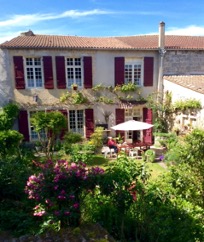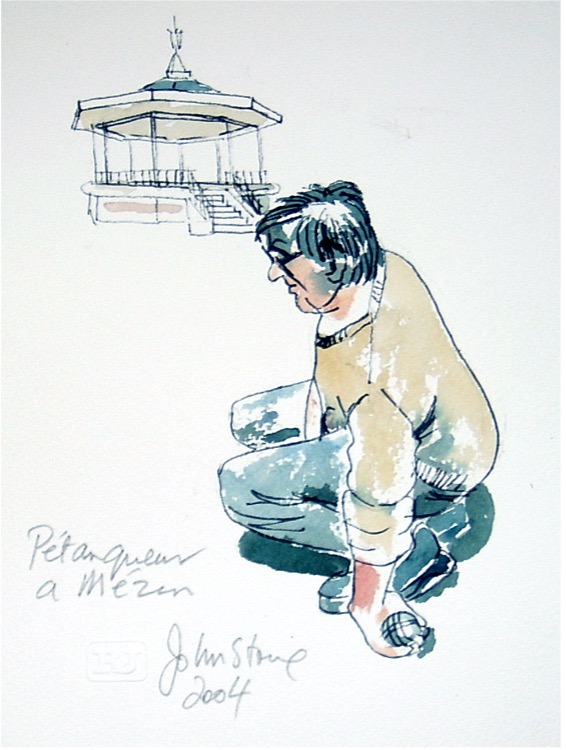French language trouble Part 1: The race is on — can you relate?
The trouble with French is that it’s impossible to learn! Yes, it is. Especially for older people. Well, that’s certainly been the case for one old person — i.e. me.

Let me elaborate…
To kick-off, I’ll set out my (very thin) credentials: I’m an elderly, probably prejudiced, mildly dyslexic, but ardent francophile who has lived in France for almost a quarter of a century.

And, although I’ve tried really, really hard to speak good French, helas, the language I’ve learned falls far short of what the l’Académie française would like me to speak. (After all, eliminating the ‘impurities in French’ is their raison d’être.)
What I speak, is a colloquial, regional language, perfect for interacting with the locals—because it’s what they speak. And it works well, down here in la France profonde.
So I can and do get on famously with the neighbourhood villageois, many of whom don’t really speak French the way l’Académie would like them to either. Most communicate in a hearty amalgam of patois, slang, gros mots, and Occitan or lenga d’òc.
And when my pétanque mates talk to me, they moderate their language, using a somewhat more standard French than they do amongst themselves. No doubt in the hope that it will help me to understand them better. And, luckily, it works!
But it’s certainly not the textbook French taught in schools or spoken on France 2 and around the Île-de-France.
Why? Because good French is so bloody hard to learn, that’s why.
Love the French people: struggle with the language?
Prenez garde, however, because I’m untrained in linguistics, and I have all kinds of Anglo-Saxon prejudices. But that’s not going to stop me from prognosticating on a range of things about learning French.
But, right upfront, I must state emphatically that I have only very positive feelings about the French themselves. I’ve always found them to be warm, friendly, helpful, and welcoming hosts, and this makes France a really great place to live.
It has a year-round pleasant climate, great food, and wonderful wine. It’s an incredibly varied and beautiful country. Meaning that it’s as close to living in paradise as one could possibly hope for.
As evidence, the world seems to have worked all this out, and France has more visitors than any other country on the planet.
So, the only downside is French. Or the difficulty I’ve had learning it.
French trouble: why learning French is soooo difficult
Although many readers will disagree, this is a brief summary of why I think it’s so hard to master:
- The spelling is impossible. With umpteen silent letters that are sometimes pronounced, other times not.
- Accents abound. These change the pronunciation (where simply changing the spelling might have been an easier option).
- Numbers take a lot of getting used to. Counting is quite straightforward—until you reach 70. For example, based on how all the preceding numbers are formed, logically, you’d expect 71 to be “seventy and one”. But non! It suddenly becomes soixante-et-onze, or “sixty-and-eleven”. 80 is quatre-vingts (four twenties). And when you get to 98? Well, it’s quite a mouthful: “quatre-vingts-dix-huit” which is “four/twenty/ten/eight”.
- Then there’s the entrenched French gender bias. Ten women make up a group of françaises. But if just one male joins them, they become français. Why? Because, “le masculin l’emporte sur le féminin!” Masculine gender prevails. French feminists recently felt they’d chalked up a victory when gender-neutral nouns were ruled OK. But France’s highest authority on language, l’Académie française issued a scathing declaration. “Inclusive writing” was putting French in “mortal peril.” And reactionary measures that would ban “l’écriture inclusive” documents have recently been proposed by President Macron’s party.
- Finally, there’s the practical side. In these days of computer dominance, the French keyboard seems deliberately designed to thwart communication. The AZERTY set-up has confounded generations of non French students and writers who can’t understand the need to make two strokes to type full-stops and numerals. And finding the very well hidden arobase (@) is always a challenge for those new to French keyboards.
French language troubles: past and future
But the main question that occupies the minds of the language nationalists is this:
Where is French headed?
Especially as an international lingua franca. And even more important to the language jingoes: Where is it in the race for top-tongue against arch-rival English?
These points will be probed in three more articles on my rambling thoughts about the trouble with French. They include:
- How Napoleon struggled with French.
- How the French struggled with French.
- How the French struggle with what the future looks like in the race against English.
- And why it’s still a great idea to learn French.
You can read my second article, ‘Who’s Winning?’ shortly. A suivre sur cette page.
Do you have trouble learning French? Can you relate to Ray’s experiences? Please share in the comments below.
The trouble with French Series:Part 1: The race is on
Part 2: Who’s winning?
Part 3: The home straight
Part 4: And the winner is… who cares?
Image credits:
- Ray lives in an 800 year old house in rural SW France where pure French is hard to find.
- Ray’s French would not be approved by l’Academie francaise.
- – 5. Copyright Ray Johnstone
Ray’s paintings of petanqueurs waiting to play at the monument aux morts.(Their French is not the French of l’Academie francaise either)










I can relate! I’m struggling with masculine vs feminine nouns. There is no rule (that I know of), that helps you determine which word is which gender.
Bonjour Michelle,
Thanks for reading my article. All I can say is that Anglo Saxon logic does not apply to French nouns. I always tell my art students that when they can get their heads around the fact that female sexual organs are masculine and male sexual organs are female, you’re half way to understanding the complexities of French gender rules. Merci encore. Ray
FROM Maree Anne
Excellent Ray. Loved reading this. I am sure many can relate to what you write. But you are so lucky you are living in France ?? and that is my dream.[This comment was left in our Facebook private group]
Thanks very much Maree Anne,
I always blame my kids. When they left home and went to uni we became the classic empty nesters in Australia. Big house with no one in it. So we decided to start all over again. The kids and grandkids are all happy it turned out like this. They can’t get enough of France. The best decision we ever made. A new life in France.
Thanks again. Ray
Hi Ray, its a relief to hear you say this, as myself, husband and my 13yr old and 9 yr old kids have just made the decision to move to France after being from England and living in Australia for the past 12 years. We are moving for the kids so your comment helps me think it is a good decision. Merci! (and no… we don’t speak French, yet! We are learning)
FROM Margie Grosvenor
Great reading.Merci![This comment was left in our Facebook private group]
Thanks Margie, Hope you enjoy the next three on the same theme. Judy’s working on them now.
Merci.
Ray
FROM Kirsten-kt
the arobase on the azerty keyboard! You’ve taken me back more than 10 years when we used to go to internet cafes. So confounding, the search for the @ ![This comment was left in our Facebook private group]
Thanks Kirsten-kt, Forget about the @, when we first came to France we spent all our time searching for a place to use the internet. They were very few and far between. Thanks for your comments.
Ray
FROM David
Sending emails home at the local Internet café in Paris! Ha ha, I’d forgotten about that Kirsten.[This comment was left in our Facebook private group]
FROM Elisabeth
David Krycer – Yep. What a nightmare that was! Although I once sent emails home to the U.S. from a Turkish friend’s place in Istanbul, and that was worse.[This comment was left in our Facebook private group]
FROM Elisabeth
I very much love part I of this series. I think that the questions raised are excellent. We must not forget two things:
– The notion of language proficiency, which comes in different flavors, mainly oral and written.
– The notion of linguistic register. We all navigate in many different worlds. Thus, the French language you share with your pétanque buddies is very different- as you point it out – from the French you’d use in a more formal environment.
And one more:
– Should we be for a very prescriptive notion of language use? Or should we consider language as fluid, and ever evolving?
I’ll let you ponder all of these issues. ????
And I taught French for some 30 years at the university level and, yes, French is hard! Although, as a native speaker, I did have an advantage! ?[This comment was left in our Facebook private group]
Merci Elizabeth, and you obviously know far more about language technicalities than I do. But I’ve always said what a nightmare English must be to learn. Hope you enjoy the next three articles when they’re published.
Amicalement
Ray
FROM Dave
sounds like all the excuses I hear.[This comment was left in our Facebook private group]
Much to consider, but if I could speak to my mates at the pétanque paddock that would satisfy most of my French goals.
Ray, other than perhaps being denied a slot on Radio France, are there any everyday drawbacks to your standard of speaking or writing?
Thanks, Mike, and yes there are. But luckily my wife speaks excellent French, so I always simply flick pass the ball to her when the going gets tough.
Amicalement
Ray
Terrific article Ray, I can totally relate. I learned French at school in Ireland although had no itention of ever going there. Fast forward
30 years or so and I decided I wanted to see Paris. Fell in love, of course, but it was to be another 25 years before I headed back.
During the last few years my husband and I have had the privilege of spending 3 months in South of France each year, along with 10 day stays in Paris. As we can’t go to Frence since March 2020 I have been trying to learn the language online. Masculine/Feminine stumps me. Love your point of female parts being male, and vice-versa. Look forward to the rest of your articles
Merci Fedelma,
Yes, gender is always difficult when we egocentrically apply our Anglo Saxon logic. To us, it seems that vélo, bicyclette. and bécane, all meaning a bike, should be one gender – but no, unfortunately (for us) they’re not. But it does make us feel quite smart when we get it right. Amicalement, Ray
Oh! Even with my name, even with a Parisian grandmothet and a father from Suisse Romande, I can’t, actually can’t, speak French! Forty years living in Australia doesn’t help but … ?
Thanks Nigelle,
Yes, the “tyranny of distance” certainly applies in Australia, but a daily half hour of French news on SBS is always there to help.
Merci encore,
Ray
Hi Ray. I concur. Having studied French as an adult in Australia, and then again in Montpellier (where I learnt more at the cafe during the breaks than I did in the class), and then again online, and then again here in beautiful Ballarat, I don’t know where to turn. This year, I opted to take a course that promised just speaking, not grammar or vocab, but this hasn’t worked either.
Think of it as brain food, Alan, is all I can say. And cafe French is the language everyone speaks anyway. French TV series like “Engrenages” can be great fun, and the cops all speak a lFrench that would give the l’Académie française a collective heart attack. Thanks for reading my article. Hope you enjoy the others.
Amicalement
Ray
I feel your pain. I’m of a certain age that makes the two meager years of high school French a distant memory. I travel to Paris enough that my vocabulary has increased but sadly, not my verbs! I faithfully plod along with Duolingo daily, and have improved but I need a tyrant to work on my pronunciation. My advice is learn French when you’re young!
Bonjour Virginia, Thanks for reading my article, and “yes” youth is the answer to just about everything. As JBS apparently said, “Youth is the most beautiful thing in this world—and what a pity that it has to be wasted on children!” But I’m sure a great way to learn French is to be locked in a room in Paris with a lover for a few weeks. Much, much too late for me now, but it’s the method I’m going to choose when my turn comes around again. Please keep a look out for the next three of my rants about learning French. Merci encore. Ray